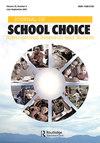Inclusive or Divisive Choices? Education Policy Preferences in the Bilingual Education System of Estonia
Q2 Social Sciences
引用次数: 0
Abstract
ABSTRACT This article investigates educational preferences in the bilingual education system that reinforce the salience of both socio-economic and socio-cultural issues. We ask, first, how many distinct groups of educational preferences exist and whether these differ by ethnic nationality. Second, we investigate the extent to which economic self-interest vs values-driven logic of preference formations explain educational preferences and whether these determinants differ by ethnic nationality. We rely on individual-level survey data and run Latent Class Analysis and multivariate regression. We find three distinctive classes of educational preferences and that relatively high popular demand for private provision and parental choice co-exist alongside respect for comprehensive schooling in Estonia. These classes differ slightly by ethnic nationality – Russians show relatively more support for inclusive choice, while Estonians show greater support for public comprehensive schooling, with only weak socioeconomic and political party influences. The only clear explanation for different latent-class belonging is values, i.e., belief in meritocracy and the fairness perception of educational inequality; somewhat surprisingly, the marginal effects of these do not differ by ethnic nationality.包容性选择还是分裂性选择?爱沙尼亚双语教育体系中的教育政策偏好
本文调查了双语教育系统中强化社会经济和社会文化问题的教育偏好。我们首先要问,有多少不同的教育偏好群体存在,这些群体是否因民族而异。其次,我们研究了经济自利与价值驱动的偏好形成逻辑在多大程度上解释了教育偏好,以及这些决定因素是否因民族而异。我们依赖于个人水平的调查数据,并运行潜在类别分析和多元回归。我们发现,爱沙尼亚人对教育的偏好有三种不同的类别,对私人教育和家长选择的相对较高的普遍需求与对综合教育的尊重并存。这些课程因民族而略有不同——俄罗斯人对包容性选择的支持相对更多,而爱沙尼亚人对公立综合学校的支持更大,只有较弱的社会经济和政党影响。对不同潜在阶级归属的唯一明确解释是价值观,即对精英统治的信仰和对教育不平等的公平看法;有些令人惊讶的是,这些措施的边际效应并没有因民族而异。
本文章由计算机程序翻译,如有差异,请以英文原文为准。
求助全文
约1分钟内获得全文
求助全文

 求助内容:
求助内容: 应助结果提醒方式:
应助结果提醒方式:


